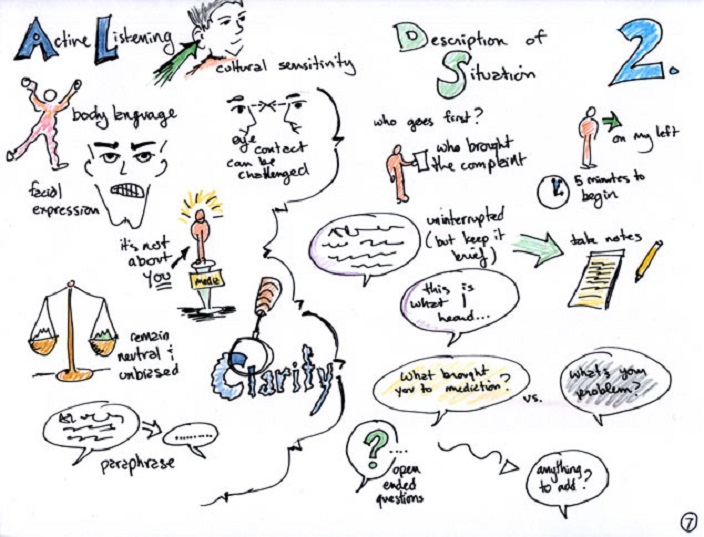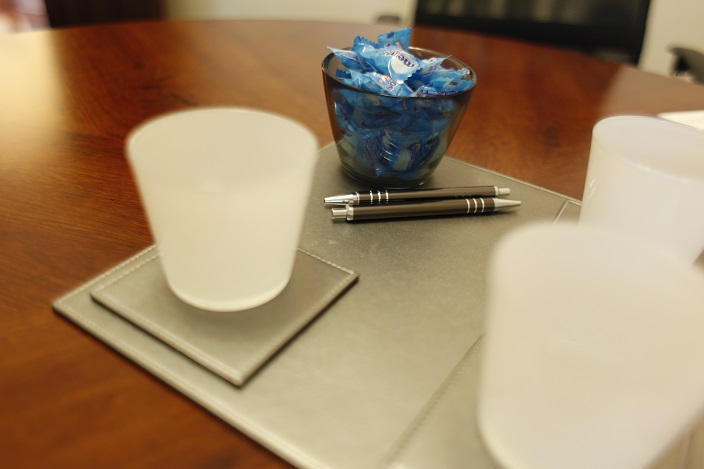
Finding your way around Coaching for FDR Practice
This page provides an overview of Coaching for FDR Practice and has the following sections:
Back to top

Coaching with Margaret Halsmith
My coaching is informed by my broad and ongoing experience as both a FDRP and an adult educator. First and foremost I am there to listen perceptively to you so that you and I can think creatively about your coaching to complement your strengths. Good rapport significantly influences the efficiency, effectiveness and outcomes of your coaching. I aim to be supportive while being assertive; friendly while maintaining clear boundaries. My role is to recommend tentatively; yours is to decide adventurously.
Your role and mine are complementary. It is my responsibility to be professional and personable and focussed on you achieving your outcomes. It is equally your responsibility to be professional and personable and focussed on achieving your outcomes.

As your coach my role is to walk beside you while you extend your capacity for proficient and sustainable practice; practice which has its basis in the interplay of your authenticity, your understanding of your role as FDR Practitioner and your approach to analysing disputes.

You can see from the images above that your role and mine add value to the other’s role. For example, your role includes listening perceptively as I speak assertively. My role includes listening perceptively as you speak authoritatively in response to my tentative recommendations. Your role includes thinking creatively regarding what I have said assertively so that you can decide adventurously what to make of my tentative recommendation.
My aim is to provide optimum conditions for you to enhance your mediator-leadership role and design proficient FDR mediations so that you can mediate with grace under pressure.
My approach is to design your coaching according to the six principles of adult learning
-
internal motivation and self-direction
-
life experiences and knowledge
-
goal orientation
-
relevant
-
practicality
-
mutual respect
My personal style is of a people-person. I find that I connect with most people most of the time. I am passionate about the peace-making possibilities of cooperative dispute resolution. I am interested to hear of your experience in FDR and to assist you to make changes that will contribute to best practice and your resilience. I aim to coach professionally and authentically in a way that is genuine, supportive and flexible. I am enthusiastic about the potential of every learning situation to become a productive one.
|
|
Coaching for FDR Practice
Coaching involves progressive, individualised recommendations of small changes in your practice by a credentialed and trusted advisor who is available to respond to your ideas with the shared aim of making a big difference in your competence and building your reputation for proficiency.
|
|
I welcome your email or phone call to discuss your coaching requirements. You can read about my experience and background in More about Coaching with Margaret. You can read recent Testimonials here.
Back to top
Back to Finding your way around

Your benefits
You will benefit from Coaching for FDR Practice particularly when
-
you are competent in most of the overt elements of FDR
-
you are ready to refine your FDR practice
-
you have had limited opportunities to practise FDR
-
you are setting up in private practice
-
you are returning to FDR after a break
-
you are joining a team of proficient FDR Practitioners
|
|
Clinically, the closer to best practice is your Mediation and Family Dispute Resolution, the healthier you, your clients and your practice are likely to be.
The overall approach and the specific interventions that you develop in coaching are yours so they are immediately applicable in your practice.
|
|
Coaching for FDR Practice participants explain how they benefited from coaching:
Fast track from newly accredited to proficient practitioner
-
learnt through success rather than through trial and error
-
learnt through adult learning principles and practice
Tailored personally
-
drew on my personality and expertise
-
took place in confidence
Makes efficient use of time and money already invested
-
introduced me to like-minded mediators
-
added value for my clients
Professionalises practice
-
provided me and my clients with certainty
-
built my reputation quickly
You can read recent Testimonials here.
|
|
The International Coach Federation describes the benefits of coaching:
Professional coaching brings many wonderful benefits: fresh perspectives on personal challenges, enhanced decision-making skills, greater interpersonal effectiveness, and increased confidence. And, the list does not end there. Those who undertake coaching also can expect appreciable improvement in productivity, satisfaction with life and work, the attainment of relevant goals.
|
|
Back to top
Back to finding your way around

Your outcomes
Your specific outcomes after participating in Coaching for FDR Practice will reflect the outcomes that you and I discuss and plan for initially then refine progressively, throughout your coaching. In general terms your outcomes will include
-
combining the many elements of FDR into an integrated approach
-
developing your leadership role throughout the mediation process
-
extending your analysis of FDR disputes
After a series of sessions of Coaching for FDR Practice you can expect your practice to be more proficient, more sustainable and more analytic due to your strengthened conceptualisation of your role.
In general terms you can expect
Personal outcomes: puts the professional into the practitioner
-
professional satisfaction
-
increased resilience
-
self-awareness and self-appraisal
-
insights into other practitioners’ approaches
Knowledge outcomes: puts the meaning into the model
-
a reading list
-
progressive analysis of disputes
-
diagnosis of conflict
-
rationale underpinning each stage of mediation
-
rationale underpinning various mediation skills
-
guidelines for interventions that are out of the ordinary,
Practical outcomes: puts the practice into the process

Artwork by Papershine
-
a notebook of annotated diagrams, flowcharts and suggestions
-
a list of things to try
-
‘how to’ for new competencies
-
new angles on old issues
-
connections with like-minded colleagues
-
the possibility of new practice areas
-
integrated practice: the model, rationale, purposes, competencies, relationships
|
|
There is a lot going on in a mediation. Your role as a FDRP is to consistently demonstrate a ‘model mediation approach’ while enabling participants to demonstrate a ‘model mediation approach’ in each of their interactions.
|
|
Back to top
Back to Finding your way around

More about Coaching with Margaret
My practice of FDR is motivated by the notion that each FDR provides participants with a glimpse of harmony and that when sufficient people have had sufficient glimpses of harmony the tipping point for mass cooperation may be reached.
My Coaching for FDR Practice is particularly motivated by my observation that excellence in practice is generated by
-
personal authenticity
-
adherence to the rationale underpinning FDR mediation
-
competent analysis of disputes
This raises the questions:
-
How can FDR mediation practice be true to the rationale of FDR while being true to the practitioner?
-
And its corollary, how can the practitioner be true to themselves while being true to the rationale of FDR mediation?
Part of the answers may be that the greater the harmony between the FDR Practitioner and the rationale of the practice the more energised may be the practice and the practitioner which may result in wise and skilled practice, satisfied participants and resilient, energised mediators.
Coaching for FDR Practice enhances your capacity to authentically
-
combine the many elements of FDR mediation into an integrated approach
-
maximise your leadership role throughout the FDR process by
-
listening perceptively for potential interventions
-
thinking creatively of FDR mediation rationale, concepts & process
-
speaking authoritatively of the process
-
deciding adventurously
-
concluding with professional and personal sincerity
-
extend your analysis of FDR disputes
You will find some information below about my philosophy, my experience and my style, both professional and practical. It may assist you to decide whether Coaching for FDR Practice is for you. I welcome your email or phone call to discuss your specific questions.
My philosophy
I value authenticity, tempered with respect for others.
In coaching as in mediation, I regard all people as
-
experts in their own lives
-
proactive and forward thinking
-
decision makers
In coaching as in mediation, I regard participants’ perceptions as
-
valid and reliable
-
reasoned
-
changeable
|
|
I am often heard to say of FDR mediation that
I regard participation as voluntary and that while a person remains at the FDR mediation, others can reasonably assume that at least in a small way the mediation is working for them. That applies to both the FDR Practitioner and the participants!
|
|
My experience
I have been a FDR mediation Coach since the mid-1990s, providing coaching during and after academic courses and as an in-house FDR consultant.
You can read recent Testimonials here.
I am very familiar with FDR competencies having
-
practised full time since 1996
-
coached at very many five day training courses
-
chaired the committee which oversaw the development of the original NMAS (National Mediator Accreditation System)
-
toured with the Attorney General’s Department to advise on FDRP competencies
-
reviewed mediator competencies for LEADR and IMI (International Mediation Institute) 2007 – present
-
provided Mediator Accreditation Coaching for National Mediator Accreditation and for LEADR 2007 – present
-
accepted a Vice-Chair position Standards Design and Implementation Committee – in the Independent Standards Commission of the International Mediation Institute.
I have considerable specialised knowledge of Dispute Resolution and teaching experience having
-
contributed to NADRAC publications 2008 - 2013
-
written and taught university courses on Dispute Resolution in a number of faculties including law, business, psychology from 1996 – 2007
-
written the ADR chapter in the WA law handbook
-
written and delivered numerous five day training courses on mediation to practitioners in many different settings from 1996 – present
-
been a member of the editorial panel of the ADR Bulletin
My professional credentials
Professionally, I maintain and extend my knowledge and skills through CPD (Continuing Professional Development). I focus on practising with integrity. My values align with the LEADR Code of Ethics and the International Mediation Institute Code of Professional Conduct.
Your feedback is requested and welcomed.
My accreditations
-
Accredited and registered FDR Practitioner [Attorney General’s Department; Australia]
-
Accredited Mediator NMAS [National Mediator Accreditation System; Australia]
-
Accredited Mediator Advanced LEADR [Association of Dispute Resolvers; Australasia]
-
Accredited Mediator IMI [International Mediation Institute; The Hague, Netherlands]
-
Appointed Mediator under Aged Care Act 1997 (Cth) and Principles 1998 -2008
Back to top
Back to Finding your way around

More information
You can read recent Testimonials here and read more about me and my practice here.
This page with the Coaching for FDR Practice FAQs provides an overview of coaching.
You can find my short descriptions of Mediation on my Twitter feed 
I welcome your email or phone call.
Back to top
Back to Finding your way around

FAQs
My Coaching for FDR Practice FAQs answer the questions I am most frequently asked.
Back to top
Back to Finding your way around

Image credit: Robert Woods